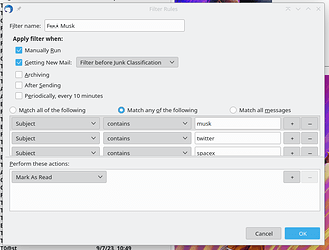Musk Filters
Can’t argue with that 
It is too easy to start saying ‘they’ (YouTube) and forget all the nuance that goes into that oversimplification.
While I appreciate the idea here, I don’t think I’ll be able to surrender my personal vendetta against Amazon any time soon. I only bring up Facebook and Amazon due to personal experiences I’ve had being on the advertising side of the fence—they are not your friends. If anything, they’re far more aggressive toward (smaller) advertisers than they are their users, who they are mostly indifferent about. Amazon is the only company that’s managed to screw me on both sides of the fence, but that’s a story for another time…
I’ll add that Richard Wolff said (YouTube) that democracy in the workplace is what is missing from society.
It’s an interesting idea but I’m not quite sure where you’re going with this. Are you saying Google, for example, would be better if corporate decisions were based on democracy? If so, I can see the pros and cons of that. Alphabet is a huge conglomerate and the guys at the top can’t see everything that’s going on, so it would be handy there. But at the same time, there are things you miss when you’re on the ground.
In this vein, Codeweavers underwent a transition to an employee-owned model recently. I don’t know how that’s going to work out for them, but it’s interesting and I wish them the best!
Vivaldi
So, I tried it out again and I just can’t get along with Vivaldi! There’s so much stuff! I mean, sure, there’s handy features like RSS feed detection I wish Firefox had built-in, and tab tiling is cool when you need it, and of course I’m using vertical tabs, and it’s very nice to know the page weight and load times, and I really like that it has a search bar + URL bar by default (the only Chromium browser that makes using multiple search engines easy, actually), but damn the interface is busy.
I think Orion achieves more of what I want (web development tools) while remaining simple. It’s too buggy though. And macOS-only.
I’m the kinda guy who runs Firefox with a GNOME userChrome to simplify things even more. As much as I hate to admit it, Chrome’s user interface did a lot to improve browser design overall. I wish Firefox wouldn’t follow them everywhere, but alas.
Don’t get me wrong, the fact that Vivaldi isn’t released under a free license is part of the reason I’ve shied away from it, but it being overwhelming is the bigger part. When I’m using a Chromium browser, I generally just want things to work. I’m not overly concerned about privacy or software freedom. There are still things I really like about the browser though; namely, the search bar. I dunno, maybe I’ll find myself gravitating back toward it.
my personal approach has been to choose web browsers which are convenient
This is the main reason I stick with Firefox. It’s not for any pithy philosophical reason; it’s just the only browser that satisfies my odd needs and wants. I’ve tried to move to Brave or Chromium but they’re just far more annoying and slower to use. I’m guessing this is an unpopular opinion because I hear a lot of people have this problem with Firefox. The only trouble I face is with a few webapps, which I switch to Chromium for.
I spend most of my working life in my browser, so I try to make it comfortable!
Further, I assume anything I do on a computer is public information and behave accordingly […] And, I put less trust in software or organizations because those will fail.
This is also my modus operandi, although on a rare occasion I’m using TOR Browser. I actually have Firefox, Brave, Chromium, Vivaldi, and TOR Browser installed on my computer right now, haha… I guess I’m not as loyal as I say I am.
Obviously I’m going full Ladybird once that’s a thing  .
.
I still don’t know whether to describe the recent Microsoft hack as one big hack that just won’t end, or a series of smaller hacks.
Your approach makes sense! As you can tell, I don’t really have much of an approach, but that’s what I’ve landed on, haha.

